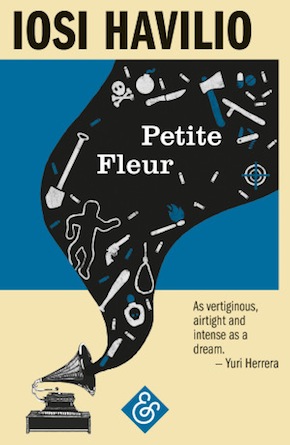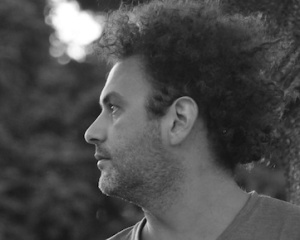Iosi Havilio: Getting away with it
by Mark Reynolds
“An absolute masterpiece.” Marie Claire
Iosi Havilio’s Petite Fleur is a virtuoso meditation on life, death, depression, anxiety, temptation, recovery and miraculous resurrection. Narrator José is down in the dumps when his job at a fireworks factory goes up in flames, but as the gloom lifts he gains an unexpected talent for guilt-free murder. Establishing that his victims seem always destined to return to life unscathed and unknowing, he embarks on an obsessive killing spree, with new jazz-loving neighbour Guillermo his weekly victim. The novel also explores creativity, Russian literature, the Argentinian psyche, illicit romance, domesticity, and dubious methods of psychotherapy. I fired off some questions via his translator Lorna Scott Fox, and received the following sparkling replies.
MR: How did the Sidney Bechet composition emerge as the perfect soundtrack for José’s repeating cycle of murders, and present the book with its title?
IH: I like to think that we come from music, and to music we will return. In this case, music is what encourages and enables the narrator to be reborn, recover his strength and regain the initiative through doing domestic chores, and at the same time it’s the cue for repeated murder. My choice of ‘Petite Fleur’ came in stages: first, an exploration of the universe of Guillermo the neighbour, that ambiguous man, refined but also tacky, music-mad but superficial and a fetishist, a character encapsulated by Bechet’s piece. Later there’s a bit on Bechet himself and his contradictions, and finally the lyrics (originally in French) that evoke through this little flower what it is that persists after the end of love, after any experience, after death.
Resurrection was a foundational text for me [but] it was rather more Crime and Punishment that set in motion this world that emerged to some extent as an exercise in parodic re-creation.”
Guillermo has 125 recordings of the song. Which are your own favourite versions?
It’s incredible, but I keep on discovering new or more way-out versions – some in terms of the arrangement, some for the way they reinterpret the tune, some that amount to real historical documents. My favourites? Bechet’s, which is unforgettable, being the original. And the versions by the Hot Sardines, Don Félix del Paraguay and Sara Montiel.
In what ways does Tolstoy’s Resurrection permeate the book?
Resurrection was a foundational text for me, for several reasons. The most personal of these has to do with the discovery of reading as a private territory. In that sense, José’s finding it in the library gives a name to what he couldn’t define. Then of course there’s all the moral issues in play in Tolstoy’s novel, which return in Petite Fleur as farce. Actually, it was rather more Crime and Punishment, especially the scene of the old lady’s murder and the subsequent roaming around, that set in motion this world that emerged to some extent as an exercise in parodic re-creation.
And how does it all tie in with your epigraph from Fogwill?
Perhaps people never die.
Maybe when dying they hear the name of death
and while it’s still ricocheting, the idea of death,
against the sign and notion of death,
life continues on hold.
That passage from Fogwill always seems to me so lovely, so plastic, heartfelt and playful. It traces an undifferentiated labyrinth between the living and the dead that I find very beautiful. It’s from a huge short novel, Help a él. An affectionate nod to a tremendous writer.
José’s admiration for Russian literature led to his clumsy parodying of some of the classics in youthful writing workshops – and the acquisition of an antique samovar and a Russian army greatcoat. Is there an element of self-parody in those recollections?
There certainly is… Here like anywhere else, a writer is at best trying out a kind of self-mockery, poking fun at the story he has constructed about himself, the story that elevates him and the one that sinks him. That step back, explicit as it may or may not be in the world being reflected, is the starting point for enabling the game. To answer your question: I passionately embraced all the clichés of loving Russian literature in my teens, bought myself the Red Army greatcoat, and inherited a samovar that never worked.
José is appalled by cult healer Horacio’s sadistic adoption of the psychomagic trauma therapies of Alejandro Jodorowsky. Do Jodorowsky’s methods have any merit?
To me, though I’m no specialist on his work, the most interesting thing about Jodorowsky is the insoluble debate into which the man and his work have been pitched. Is he for real or not? Is he serious, or just having us on? He sets up a debate on the most established and distinguished forms of knowledge: poetry here, psychology there, drama over there… His acts of magic put reality on the spot, they ridicule it, while accepting the risk of making himself ridiculous.
Jodorowsky’s film output is distinguished by surreal violence, mysticism, anxiety and provocation (José describes Santa Sangre as “awful, but impressive… [mixing] art and politics in a stream of baroque, garbled allegories”). Is Jodorowsky an influence on your writing – even if only in a cautionary sense?
I’d say rather that Jodorowsky nourishes that universe. I don’t believe in personal influences, so much as in the criss-crosses, amalgams, collisions that arise between worlds.
Argentina was built on a circle of banishments and uprootings, a circle both vicious and virtuous…. There’s no alternative to being reborn through a fresh spin of the wheel of dispossession.”
Towards the end of the book, José remarks that “We in the West, believers and unbelievers alike, are partial to trinities.” What are the main examples of this?
It’s a statement, but it’s also a joke. In the West the notion of the trinity, the word itself, is certainly at the root of belief. Of the credo. But that said, I just as much want to say that it’s an aphorism José produces without much to back it up, just because he likes the sound of it.
He also observes that the Argentine national character is defined by an instinct “to throw everything away on a bet… A periodic summons to destruction and resurgence”; in which throughout history and in the present, “immigrants and creoles… rich men, lovers, artists, [fritter] away their works, the better to recognise themselves in downfall.” Would you agree?
Argentina was built on a circle of banishments and uprootings, a circle both vicious and virtuous. The vice of expulsion includes the colonial period, the desert campaigns and the various waves of immigration from the nineteenth century onward, which presuppose a place to restart one’s life following crisis (when you’ve lost everything, left it all behind, loved ones as well as belongings). There’s no alternative to being reborn through a fresh spin of the wheel of dispossession. Something of this logic keeps coming back and back, although the next generations are (we hope) likely to overcome this pattern in order to found another. To overstate the case, and looking beyond Argentine history, one could venture that the construction of any identity involves an endless gymnastics of death and resurrection.

 You are invariably described for English-speaking audiences as a ‘cult’ author. Are you regarded as mainstream in Argentina?
You are invariably described for English-speaking audiences as a ‘cult’ author. Are you regarded as mainstream in Argentina?
Neither cult nor mainstream. Time is very good at piling on equivocation. All that matters is to work and play, play and work, so as to continue feeling unfamiliar to oneself.
Open Door and Paradises were translated by Beth Fowler. How did Lorna Scott Fox come to translate Petite Fleur? How closely did you work with her, and how did the process differ from the earlier books?
Translation is not treason, on the contrary, it’s the chance to discover new elements within the world in question. The back-and-forth with Lorna, as with Beth Fowler before, covered a wide spectrum. From specific words or idioms, to deeper and more crucial issues that keep said world turning. With Petite Fleur, we particularly discussed space, the type of homes where the protagonists live. That’s where I realised that over and above the clarity of any description, the real map is the one that’s drawn in the narrator’s head. Lorna’s query was fundamental for her to visualise the relevant spaces, in turn enabling the protagonist to inhabit his own territory in English. The difference between a good translator and a mediocre one is that the first deals with the book’s universe, while the second sticks to the text.
In my experience of writing – and of life – the frenzy of dreams and that of form always go together. Sometimes one has the upper hand for a bit, takes over the surface.”
Time slows and quickens as past events tumble into the present, and the narrative structure of a single long paragraph intensifies that sense of distortion. At what point in the writing did you decide it would be a continuous block of text?
It was not so much deciding, as yielding to the evidence… There was something about the feverishness of the writing, the impossibility of holding it back, that closely connects with the moment when the narrator spews everything out at the end of the novel.
Did you write it in a kind of fever dream, or were the structure and plot fairly clear to you before you started?
In my experience of writing – and of life – the frenzy of dreams and that of form always go together. Sometimes one has the upper hand for a bit, takes over the surface. As I recall, there was a fevered period at one point until the plot became stuck, and then a structural hypothesis came up and set the machinery going again, demanding dodges and swerves. And so it went on until finding its final form, which is never final.
What have you been writing since, and what is likely to be the next work published in English?
I’ve embarked on two loosely related projects that have little resemblance to my previous work, or rather, in which the various things I’ve done converge; where fantasy, social realism, adventure and autobiography jostle among themselves. An English translation? You never know.
Which writers do you find yourself re-reading for pleasure and for inspiration?
Recently I’ve felt strongly drawn to poetry, both classical and contemporary. Argentine poets, Uruguayan and Chilean ones as well… French, English, even Afghan poets.
Which other contemporary Argentinian and Latin American writers should we be reading?
Juan Cárdenas, Pablo Katchadjian, Agostina Luz López, Aldana Capellano… and so many more. Read as many as possible.
 Iosi Havilio was born in Buenos Aires in 1974. His work has been praised by Argentine writers and critics including Rodolfo Fogwill and Beatriz Sarlo, and drawn comparisons with writers as diverse as Albert Camus and Michel Houellebecq. Petite Fleur and his earlier novels Open Door and Paradises are published by And Other Stories.
Iosi Havilio was born in Buenos Aires in 1974. His work has been praised by Argentine writers and critics including Rodolfo Fogwill and Beatriz Sarlo, and drawn comparisons with writers as diverse as Albert Camus and Michel Houellebecq. Petite Fleur and his earlier novels Open Door and Paradises are published by And Other Stories.
Read more
Lorna Scott Fox is a journalist, editor and translator who has lived all over the world. She has written for the London Review of Books, the TLS and the Washington Post, translated many books from French and Spanish, and edited Yuri Herrera’s Signs Preceding the End of the World (And Other Stories, 2015).

